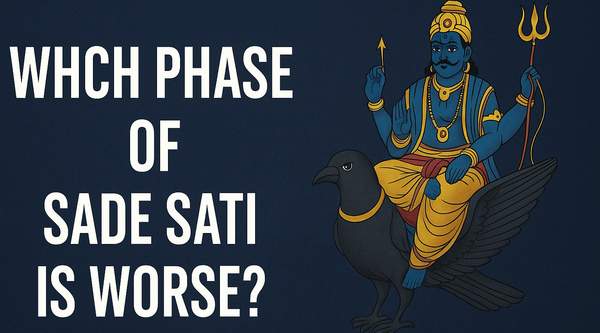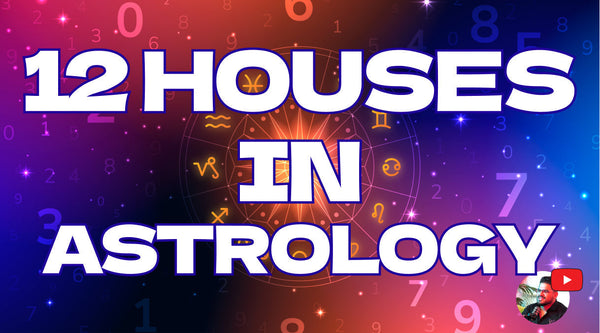Retrograde Planets in Astrology: Saturn, Jupiter, Mars, Venus & Mercury
Retrograde planets, or Vakri Grahas, often captivate interest due to their unique and intense influence within the realm of Vedic astrology. While they appear to move backward from Earth’s perspective, their retrograde motion is an optical illusion, symbolizing an inward-focused, amplified energy that can shape a person’s life path, relationships, health, and more. Retrograde planets in a Kundali don’t always imply challenges; instead, they intensify the qualities of the planets, offering both beneficial and challenging outcomes depending on the house and placement. This article delves into the mysteries of retrograde planets, aiming to clear common misconceptions, and highlight the nuances of each planetary influence.
In this three-part series, we’ll explore the impact of retrograde planets, examining conditions that make their influence positive or negative and discussing how their placement can bring life-altering events. With insights into each planet’s retrograde influence, we’ll clarify how they shape various life aspects and offer practical guidance for harnessing these energies to make the most of each planetary influence.
Key Influences of Retrograde Planets in Astrology
1. Understanding Which Planets Go Retrograde
In a Kundali, not all planets exhibit retrograde motion. Only Saturn, Jupiter, Mars, Venus, and Mercury can be retrograde, each with its unique retrograde period. Saturn, for instance, retrogrades for 140 days, with an additional 10 stationary days, making its total retrograde duration 150 days. Jupiter, on the other hand, retrogrades for 130 days, with a stationary period of 10 days. Mars, Venus, and Mercury each have shorter retrograde durations, impacting personal aspects of life more acutely.
Knowing the retrograde timing and stationary period of each planet allows for greater control over life decisions, particularly during these retrograde phases. For instance, retrograde Saturn signifies a time of introspection and patience, while Mercury retrograde calls for caution in communication, contracts, and travel. By understanding these unique retrograde cycles, one can better align life plans with the energies at play.
2. Retrograde Saturn’s Positive Health Influence in Key Houses
A retrograde Saturn in the 3rd, 6th, or 11th houses can bring a surprising health benefit, helping the individual recover from health issues or ailments during its dasha or antardasha. Saturn’s association with discipline, structure, and patience extends to physical health when retrograde in these houses, fostering resilience and strength.
This unique placement suggests that Saturn’s retrograde influence isn’t universally challenging. For example, in the 3rd house, it enhances endurance, aiding the native in overcoming health issues through mental strength. In the 6th house, Saturn’s retrograde offers an opportunity to address chronic health problems with a proactive approach. When in the 11th house, it brings support from friends and communities, enhancing both physical and emotional well-being. Retrograde Saturn in these houses exemplifies how retrograde energy can be harnessed for positive transformation, especially in health.
3. The Myth of Previous House Influence for Retrograde Planets
One widespread misconception in astrology is that retrograde planets impact the previous house they occupied. This belief holds a partial truth: a retrograde planet will exhibit influence over its previous house only if it is positioned within 0 to 10 degrees in its current house. If it occupies between 10 to 30 degrees of the current house, it fully influences that house alone.
For example, a retrograde Jupiter at 7 degrees in the 4th house may exhibit qualities of the 3rd house, reflecting themes related to communication and courage, while also focusing on 4th house themes like home and security. However, if Jupiter is positioned at 15 degrees in the 4th house, its impact will remain strictly on the 4th house, emphasizing themes of family, security, and emotional well-being. This distinction is essential for accurate Kundali interpretations, as the house impact of retrograde planets varies based on degree placement.
4. Amplification of Rashis and Planets Through Retrograde
Retrograde planets carry an interesting trait: they significantly amplify the Rashis they control in both the D1 chart (birth chart) and the D9 chart (Navamsa). This influence strengthens the planets positioned within these Rashis, heightening their impact in the native’s life. However, “strength” does not always mean positive results—if the planets in these Rashis have negative aspects or malefic influence, their adverse effects can also intensify.
For instance, if a retrograde Mars controls Aries and Scorpio in the D1 and D9 charts, any planet positioned in these signs will experience an amplified effect. Benefic planets will bring enhanced support, while malefic planets will carry greater challenges. Retrograde Mars will increase the assertiveness and energy in these Rashis, making their influence prominent in various life events. The retrograde planet’s impact, therefore, isn’t inherently beneficial or harmful—it’s simply stronger. This principle underscores the importance of examining Rashi control and understanding how retrograde energies manifest in both birth and Navamsa charts.
5. Life-Changing Events Triggered by Retrograde Planets in Transit
When a retrograde planet in transit aligns with a retrograde planet in the D1 chart, the resulting energy can be transformative, often bringing about significant life changes. This alignment “activates” the dormant retrograde influence in the natal chart, leading to events that can shift one’s life direction, career, relationships, or personal growth trajectory. These changes can be dramatic, aligning with the qualities and house rulership of the planets involved.
For example, if retrograde Jupiter in transit aligns with a retrograde Saturn in the natal chart, the native may experience a transformative period related to finances, beliefs, or career growth, depending on the houses involved. This transit serves as a powerful period for growth, marking a time of both challenge and reward. Life-changing events typically emerge as opportunities for learning and transformation, allowing the native to embrace new perspectives or shift toward a more fulfilling life path.
6. Hierarchies of Planetary Strength: Exalted, Retrograde, and Vargottama
In Vedic astrology, planets differ in strength based on specific conditions, with exalted planets being the most powerful, followed by retrograde planets, and then Vargottama planets. Each condition adds a distinct quality to the planet’s influence, affecting its ability to bring positive or negative outcomes.
• Exalted Planets: An exalted planet achieves its highest potential, expressing its positive qualities without restrictions. For instance, exalted Jupiter in Cancer offers enhanced wisdom, compassion, and growth, making it the strongest condition in the chart.
• Retrograde Planets: Though not as powerful as exalted planets, retrograde planets have intensified energy. A retrograde Venus can bring stronger influence in relationships, art, or finance, especially if in a favorable position.
• Vargottama Planets: When a planet occupies the same sign in both the D1 and D9 charts, it becomes Vargottama, providing consistency and stability to its influence. Though not as powerful as retrograde or exalted planets, Vargottama planets bring a steady, reliable impact, enhancing their houses without disruption.
Understanding this hierarchy helps astrologers prioritize planetary influences based on their strength, enabling more accurate interpretations of life events and personal qualities.
7. Determining Positive or Negative Results for Retrograde Planets
While retrograde planets are generally associated with powerful influence, the nature of their effects depends on various factors, such as conjunctions and aspects. For example, a retrograde Mercury may bring beneficial or challenging outcomes depending on the planets it’s influenced by:
• Positive Influence: If benefic planets like Jupiter, Venus, or Moon aspect retrograde Mercury, it brings positive results, aiding areas like communication, creativity, and learning.
• Negative Influence: Conversely, if retrograde Mercury is impacted by malefic planets such as Rahu, Saturn, or Ketu, it may bring challenges in communication, mental clarity, and decision-making.
These influences highlight the importance of considering a planet’s condition and its surrounding planetary energies in the Kundali. By recognizing these factors, one can anticipate and adapt to the challenges and benefits brought about by retrograde planets.
8. Dispelling the Myth: Do Retrograde Planets Affect the Previous House?
A popular belief suggests that retrograde planets give results of the previous house they occupied before moving retrograde. This is both true and false, depending on the degree placement of the retrograde planet within its current house. If the planet is positioned within 0 to 10 degrees in its current house, it can reflect some influence from the previous house. However, when the retrograde planet is between 10 to 30 degrees, it exhibits influence solely from its current house.
For example, if retrograde Venus is placed at 8 degrees in the 6th house, it may carry qualities of the 5th house, such as creativity, romance, or learning. However, if Venus occupies 18 degrees in the 6th house, it fully represents health, service, and daily routine without a backward pull from the previous house. This detail allows for more precise analysis of retrograde influence and clarifies that degree placement is crucial for understanding how retrograde planets function within the house they occupy.
9. Retrograde Saturn’s Positive Health Impact in Key Houses
Retrograde Saturn can yield surprisingly positive outcomes, especially for health, when placed in the 3rd, 6th, or 11th houses. During its dasha or antardasha, retrograde Saturn in these houses supports recovery and resilience, providing strength to overcome health challenges. The 3rd house influences mental and physical stamina, the 6th house governs health and healing, and the 11th house provides support from social circles and friends, all contributing to a favorable health outlook.
For instance, if retrograde Saturn is in the 6th house, the native may have improved recovery from chronic ailments and gain health benefits, particularly during Saturn’s planetary periods. This favorable placement illustrates that retrograde Saturn is not universally challenging and can serve as a powerful ally for well-being when positioned in certain houses.
10. Retrograde Transit on Natal Retrograde Planets: Triggering Major Life Events
When a retrograde planet in transit influences a retrograde planet in the natal chart, it often triggers profound, life-changing events. This alignment activates the natal retrograde planet’s full power, resulting in significant transitions. The types of events vary based on the planets involved, but they generally initiate transformation in areas such as career, relationships, personal growth, or spiritual awareness.
For instance, if transiting retrograde Jupiter aspects a natal retrograde Mars, it may catalyze career shifts, relocations, or new business ventures, depending on the houses Mars rules. Such alignments serve as turning points, marking phases of growth and reevaluation. Understanding these influences allows one to anticipate pivotal moments and adapt to shifts with confidence and awareness.
11. Practical Tips for Harnessing Retrograde Energy
Navigating retrograde periods requires a blend of caution and flexibility. Here are some practical strategies for making the most of retrograde energy in your life:
• Reflect and Reassess: Retrograde periods offer an opportunity for introspection. Use this time to evaluate goals, relationships, and career plans.
• Focus on Personal Development: Retrograde planets often bring awareness to areas that need growth. Engage in practices that nurture patience, resilience, and insight.
• Anticipate Delays: Retrogrades may bring delays or obstacles, particularly in Mercury retrograde phases, so avoid making major decisions until the retrograde period ends if possible.
• Embrace Change: Retrograde planets, especially when in alignment with natal retrograde influences, are known to bring transformative events. Being open to change will help you flow with these energies instead of resisting them.
Conclusion
Retrograde planets offer unique energies that can significantly shape our lives, encouraging us to dig deeper, slow down, and re-evaluate key areas of existence. From Saturn’s health benefits in specific houses to the impact of a retrograde transit on natal retrograde planets, these energies are neither purely positive nor negative—they amplify whatever they represent, bringing attention and strength to their respective houses and Rashis.
The hierarchy of planetary strength—where exalted planets hold the greatest influence, followed by retrograde, then Vargottama—further clarifies which planets in the Kundali are most impactful. By understanding the degree-specific myth of retrograde planets’ house influence, we also gain clearer insight into their actual behavior.
In essence, retrograde planets encourage reflection, resilience, and recalibration. Rather than viewing them as roadblocks, we can embrace their lessons, using these insights to navigate challenges and recognize opportunities. With this knowledge, retrograde planets become powerful allies in self-discovery and growth, turning introspective phases into times of positive transformation. Whether navigating Saturn’s disciplined retrograde or Mercury’s fast-paced communication challenges, understanding and working with retrograde energy can empower you to create meaningful progress in all areas of life.


















































